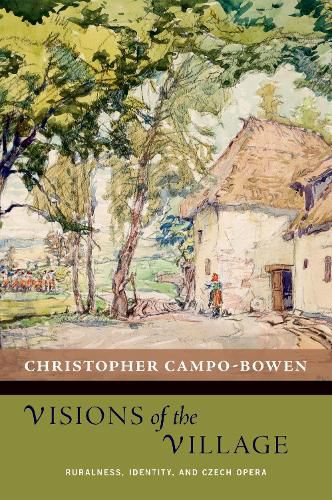Readings Newsletter
Become a Readings Member to make your shopping experience even easier.
Sign in or sign up for free!
You’re not far away from qualifying for FREE standard shipping within Australia
You’ve qualified for FREE standard shipping within Australia
The cart is loading…






Visions of the Village offers a nuanced account of the cultural history, political salience, and social resonances of Czech village operas, especially those by composers Bed%rich Smetana, Antonin Dvo%rak, and Leo%s Jana%cek. By examining music-critical writings, institutional and government records, letters, and other archival sources, Christopher Campo-Bowen examines how musical representations of the idealized village acquired and provided meaning for Czech audiences, serving as the basis for understandings of a wide range of sociocultural and political issues, including gender, class, nationalism, imperialism, ethnicity, and race. This book explores how operas like Smetana's The Bartered Bride, Dvo%rak's The Devil and Kate, and Jana%cek's Jen@ufa served as focal points for the articulation of an essentialist sense of Czech identity. In addition to composers and their operas, Campo-Bowen investigates the output of critics, administrators, and other urban intellectuals like Otakar Hostinsky, Franti%sek Adolf %Subert, and Zden%ek Nejedly to understand the impact of village operas on public discourse. Through this in-depth analysis, this book uncovers how music functions at the nexus of the desire for politically resonant ethnoracial identities and the representation of ruralness, from the nineteenth century to the present.
$9.00 standard shipping within Australia
FREE standard shipping within Australia for orders over $100.00
Express & International shipping calculated at checkout
Visions of the Village offers a nuanced account of the cultural history, political salience, and social resonances of Czech village operas, especially those by composers Bed%rich Smetana, Antonin Dvo%rak, and Leo%s Jana%cek. By examining music-critical writings, institutional and government records, letters, and other archival sources, Christopher Campo-Bowen examines how musical representations of the idealized village acquired and provided meaning for Czech audiences, serving as the basis for understandings of a wide range of sociocultural and political issues, including gender, class, nationalism, imperialism, ethnicity, and race. This book explores how operas like Smetana's The Bartered Bride, Dvo%rak's The Devil and Kate, and Jana%cek's Jen@ufa served as focal points for the articulation of an essentialist sense of Czech identity. In addition to composers and their operas, Campo-Bowen investigates the output of critics, administrators, and other urban intellectuals like Otakar Hostinsky, Franti%sek Adolf %Subert, and Zden%ek Nejedly to understand the impact of village operas on public discourse. Through this in-depth analysis, this book uncovers how music functions at the nexus of the desire for politically resonant ethnoracial identities and the representation of ruralness, from the nineteenth century to the present.